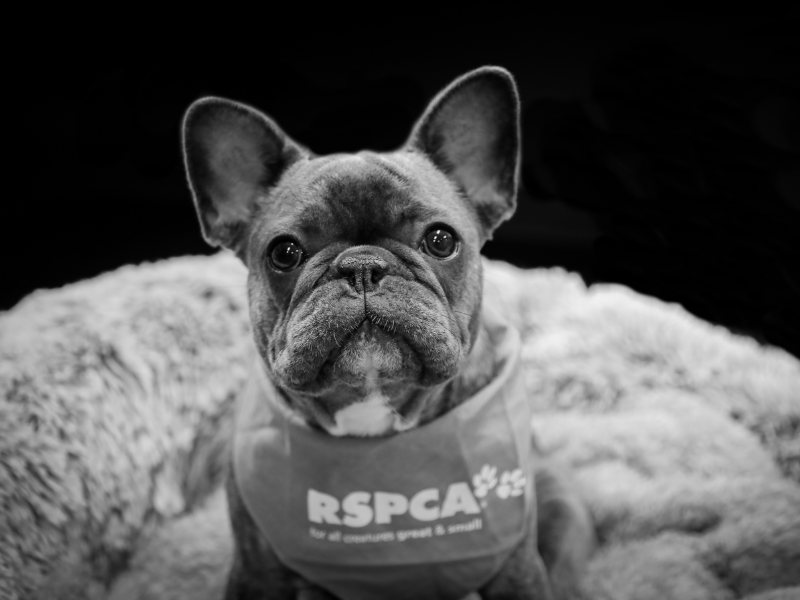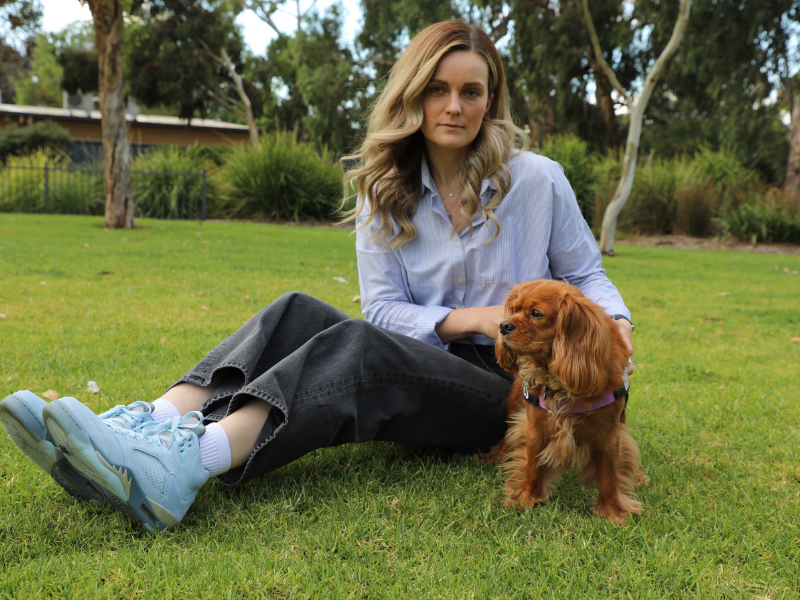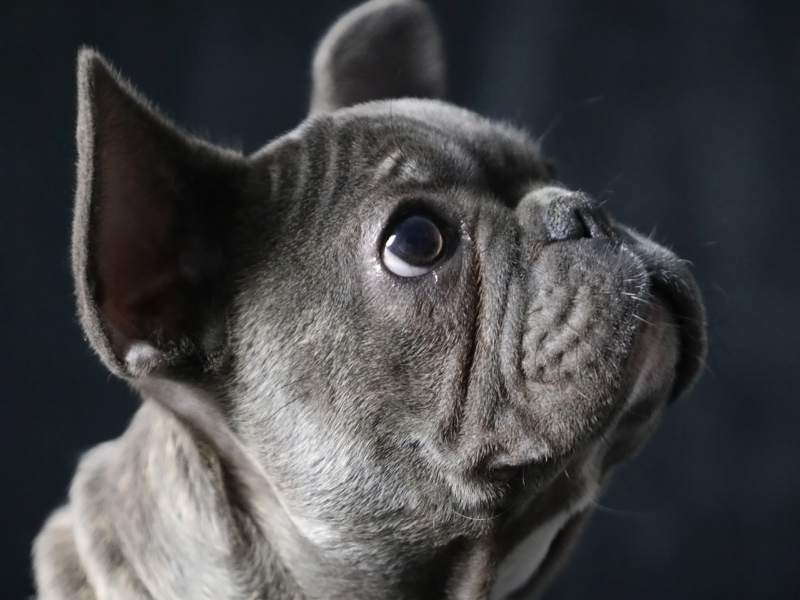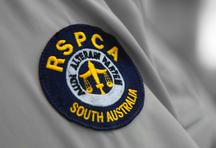Anxiety, fear and uncertainty – owners share their stories of owning a squishy-faced dog
April 29, 2022Fifi’s eyes dart back and forth across the room, her discoloured face, drooping ears and laboured breaths all signs of a dog who is in desperate need of help. Fifi’s tongue and gums are turning grey, she is gasping for air. Her owner, Marta is quick to notice something is wrong. Fifi is rushed to an emergency room and placed on oxygen, Marta sighs with relief – “Another close call.”
The one-year-old French Bulldog has no debilitating medical illnesses, there’s nothing to make her stand out from the rest of her breed. For Pugs, British and French bulldogs and Boxers, breathing difficulties are all too common. It’s a sad fact that half of all dogs that are brachycephalic breeds suffer from brachycephalic obstructive airway syndrome (BOAS).
Fifi is one of many breeds created to look ‘cute,’ and unfortunately, like many attempts by breeders to create animals with mass-market appeal, something has gone terribly wrong. Thanks to selective breeding, the length of these breeds’ muzzles has progressively shortened. However, the soft tissue inside has not reduced, and this tissue is blocking their airways. Their nostrils and windpipes may also be constricted, making it even more difficult for them to fill their lungs. These dogs endure the constant and excruciating sensation of being suffocated.
Some dogs will faint or collapse due to a lack of oxygen, especially when exercising or excited. Others may overheat, sometimes fatally. Unfortunately for Fifi, this close call is unlikely to be her last.
Fifi (a rescue dog who frequents our Stepney headquarters) isn’t alone. Three of our canine RSPCA office regulars all suffer as a consequence of being brachycephalic breeds. All three owners wish to share their stories and explain how it’s a constant uphill battle to give their beloved dogs comfortable and happy lives.

Shaking as a puppy and needing two major surgeries, Fifi has required plenty of support from owner Marta
A year has passed since Fifi came into Marta’s care. The once pocket-sized Frenchie has almost grown to her adult size and has plenty of energy to expel zipping along the carpet in RSPCA’s head office in Stepney. Marta fondly refers to her as her ‘Feefs, Munchkin and little gargoyle’ – the staff have become accustomed to Fifi greeting them each morning with a cacophony of excited snorts and have fallen in love with her charming quirks.
Whilst on a surface level it appears like an ideal scenario (who wouldn’t want to have their furry best friend accompanying them to work?), there have been plenty of stressful moments throughout Fifi’s short-lived life to keep Marta worrying.
“When I took her home as a foster animal, it was devastating to see this little puppy heaving and struggling to breathe, she was literally shaking. When you see an animal that young, and you know they have a whole life ahead of them which will be a constant challenge, it’s really upsetting,” said Marta.
“Within the first year of her life she has had two operations, she has had her soft palate cut back, her tonsils removed from her throat and parts of her nostrils enlarged. She has spent a lot of time under the knife for a dog of any age. These dogs require a special amount of care.”
Even after her two surgeries, Fifi will never experience a full bill of health.
The true cost of owning a brachycephalic breed
A silver life-sized statue of a pug sits guard at the entrance to Cassandra’s office, a testament to one of her favourite pedigree breeds. While she is busy typing away at her keyboard or answering the phone, she can feel the gaze of two chocolate brown little eyes burning into the back of her head. Minnie the French Bulldog, is infatuated with Cassandra and is determined to stay within arm’s reach (patting distance) of her favourite human.
Minnie appears much older than she actually is – her body bears scars from her former life, one of mistreatment, over-breeding and neglect. It has been a slow and challenging journey, involving many dedicated hours of rehabilitation by Cassandra.
“I have had to modify my lifestyle quite a lot, but my dogs are part of my family and they deserve to be treated as such,” she explains.
“Gone are the days when people adopt dogs and leave them in the backyard. They belong in the home, it’s theirs too.
“I’m always worried about Minnie getting heat stress, it’s happened before, I waited for an hour to get her breathing levels back down to normal, her gums went white, her tongue went blue – it was just a really scary moment. These dogs, if left in a backyard in warm weather, can die from heat stress. They just don’t have the physiology to cool themselves down effectively.”
Cassandra has experienced an unexpected cost of owning a Frenchie – power bills.
“I just received my bill last night and it was just under $1000. I live alone and that was just for three months. Most of that was from the air conditioner needing to be on whenever they are home, especially at night when their panting can get so loud it keeps me awake.”
“Any temperature over 25 is detrimental for her. It’s also hard because she’s so sociable and really loves going to the dog park, where she races around and you feel guilty telling her to stop having fun. If it’s too hot, the walks become shorter, her time at the dog park is limited and I have to pause her playtime so she can catch her breath and cool down.”
Some dog breeds have major difficulty giving birth. British bulldogs, French bulldogs and Pugs are deliberately selected for a large head, broad shoulders and narrow pelvis, which means the pup’s head and shoulders are too large to fit through their mother’s pelvic canal, causing major birthing problems.
You can instantly see the physical toll giving birth has had on Minnie. The elasticity in her undercarriage has given way, causing her lower abdomen to sag. Generally, they can’t give birth normally and require veterinary assistance and a cesarean section. Over 80 per cent of Bulldog litters are delivered this way.

Frenchies aren’t alone in the suffering
Cavalier King Charles Spaniel Maggie spends most workdays snoring under the canopy of her miniature tepee. Clean and soft, her favourite workplace bed is a stark contrast to the dilapidated house of horrors RSPCA inspectors rescued her from. Owner Emma fondly refers to her as ‘Mags’ – the pair are inseparable.
Maggie has a placid temperament. Her eyebrows crease with concern when other dogs greet her with too much enthusiasm, she is much more inclined to sit calmly on the sidelines than play. Emma has accepted that Mags will carry a small amount of psychological trauma from her upbringing, something that will never be fully fixed. “Above anything else, I just want to improve her quality of life. Her past is quite sad and I want to ensure every moment from now on is an enjoyable experience for her.”
Whilst Emma strives to provide Mags with all the creature comforts she may need, there are some things she is unable to fix. Emma admits her own sleeping pattern has become rocky following the deterioration of Maggie’s ability to breathe at night.
Emma yawns mid-sentence, as she details the horrors of waking up at 2 am to Mags having a breathing attack. “It’s shocking – you hear the noise and you are startled awake. I lay there thinking ‘is she going to breathe, is she going to breathe?’
“It’s progressively getting worse and I’m scared I might one day sleep through it,” says Emma.
Just like the Frenchies in the office, Mags will soon undergo surgery in a bid to clear her airways. Emma is nervous about the operation but feels it’s the only option she has left. “The idea of surgery is a little anxiety-inducing, but I feel like we’ve just got to get it over with.”

You can’t put a price on love
The existence of Brachycephalic breeds almost feels like the plot of a gothic horror novel – the selfish pursuit of genetically altered dogs to create something ‘aesthetically pleasing,’ an industry profiting off the cost of suffering. Contrary to what some people think, there is nothing “cute” about a snorting animal. That is the sound of an animal struggling to breathe.
So what lessons can we take from this Frankenstein-esque industry? Science has gone too far? Do actions have consequences? Don’t play God? Maybe it’s all of the above.
For all three owners, the debate surrounding these breeds is conflicting. Despite the sleepless nights, anxiety-induced medical emergencies and expensive operations, all three expressed an unwavering loyalty toward their dogs. These are members of their family, they are loved and they are priceless.
Most Brachycephalic owners will probably relate to these hardships. Cassandra, Emma and Marta have all noted how lucky they are to have a strong support network for the care of their dogs. They acknowledge the unique nature of being within a workforce where they can bring their dogs to the office and how invaluable it is to be surrounded by experts in animal behaviour and medical practice. A vast majority of owners are excluded from this privilege and will face the hardships alone.
“Fifi is a rescue dog, so I don’t feel guilty for owning her. I wouldn’t trade anything in the world for her. She never had a choice to be born and I am committed to making sure her life is the best it can be,” said Marta.
“The suffering these dogs experience is just heartbreaking and I feel it is important for people to take this into consideration before they make a choice to purchase a particular breed of dog. We need to stop the unnecessary suffering and support ethical breeders who breed happy healthy dogs.”
If you’re a potential puppy buyer, you can help by reading the RSPCA Smart Puppy and Dog Buyer’s Guide and choosing not to buy puppies with exaggerated features that compromise their welfare. If you already own one of these breeds, speak to your veterinarian about ways to help your much-loved pet live a more comfortable life, and avoid some of the worst consequences of these genetic disorders. And make sure your dog is desexed, so it doesn’t pass on health problems to the next generation. We need to reverse the damage, if possible, in existing dogs – and just as importantly, we need to cease breeding any more of them.



